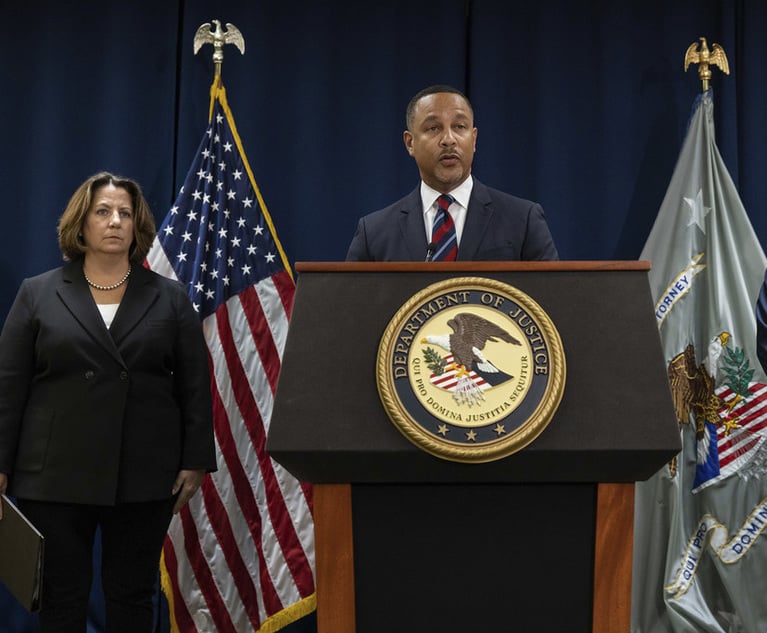Compliance Hot Spots: Fifth Circuit Deems SEC In-House Judges Unconstitutional + Kaplan Hecker Partner Lands DOJ Role + MoFo Snags White-Collar Leader
A ruling from the U.S. Court of Appeals for the Fifth Circuit has raised pressing questions about the future of SEC enforcement proceedings.
May 25, 2022 at 06:18 PM
9 minute read
Compliance Hot SpotsWelcome to Compliance Hot Spots, our weekly snapshot on white-collar, regulatory and compliance news and trends. Today, we explore the implications of a new court ruling on SEC's in-house judges. Plus, a Kaplan Hecker partner is leaving for a senior role at DOJ and Morgan Lewis counsels a bank ensnared by the SEC's ESG task force. Please get in touch with tips and feedback. Contact me at [email protected] and @AGoudsward on Twitter.
 U.S. Court of Appeals for the Fifth Circuit in New Orleans. Photo: Mike Scarcella/ALM
U.S. Court of Appeals for the Fifth Circuit in New Orleans. Photo: Mike Scarcella/ALM Fifth Circuit Ruling Strikes at Heart of SEC Enforcement
In a ruling that could potentially upend the SEC's enforcement proceedings going forward, a federal appeals court ruled May 18 that the SEC's in-house adjudication process is unconstitutional, my colleague Marianna Wharry reports.
A three-judge panel of the U.S. Court of Appeals for the Fifth Circuit said in a 2-1 opinion in Jarkesy v. SEC that the agency's use of administrative law judges violates defendants' Seventh Amendment right to a jury trial, that Congress unconstitutionally delegated legislative power to the SEC in giving it "unfettered authority to choose whether to bring enforcement actions in Article III courts or within the agency," and that statutory restrictions on the president's ability to remove SEC ALJs violates the Take Care Clause of Article II.
"The Seventh Amendment guarantees Petitioners a jury trial because the SEC's enforcement action is akin to traditional actions at law to which the jury-trial right attaches," Circuit Judge Jennifer Walker Elrod wrote for the majority, joined by Circuit Judge Andy Oldham. "And Congress, or an agency acting pursuant to congressional authorization, cannot assign the adjudication of such claims to an agency because such claims do not concern public rights alone."
This content has been archived. It is available through our partners, LexisNexis® and Bloomberg Law.
To view this content, please continue to their sites.
Not a Lexis Subscriber?
Subscribe Now
Not a Bloomberg Law Subscriber?
Subscribe Now
NOT FOR REPRINT
© 2025 ALM Global, LLC, All Rights Reserved. Request academic re-use from www.copyright.com. All other uses, submit a request to [email protected]. For more information visit Asset & Logo Licensing.
You Might Like
View All
Compliance Hot Spots: GOP Eyes ESG as an Antitrust Issue + Another DOJ Crypto Seizure + Sidley Partner Jumps to Main Justice
9 minute read
Compliance Hot Spots: Lessons from Lafarge + Fraud Section Chief Talks Compliance + Cravath Lands FTC Commissioner
11 minute readLaw Firms Mentioned
Trending Stories
- 1Decision of the Day: Judge Sanctions Attorney for 'Frivolously' Claiming All Nine Personal Injury Categories in Motor Vehicle Case
- 2Second Judge Blocks Trump Federal Funding Freeze
- 3Crypto Hacker’s $65 Million Scam Ends in Indictment
- 4Trump's Inspectors General Purge Could Make Policy Changes Easier, Observers Say
- 5Supporting Our Supreme Court Justices in the Guardianship Part
Who Got The Work
J. Brugh Lower of Gibbons has entered an appearance for industrial equipment supplier Devco Corporation in a pending trademark infringement lawsuit. The suit, accusing the defendant of selling knock-off Graco products, was filed Dec. 18 in New Jersey District Court by Rivkin Radler on behalf of Graco Inc. and Graco Minnesota. The case, assigned to U.S. District Judge Zahid N. Quraishi, is 3:24-cv-11294, Graco Inc. et al v. Devco Corporation.
Who Got The Work
Rebecca Maller-Stein and Kent A. Yalowitz of Arnold & Porter Kaye Scholer have entered their appearances for Hanaco Venture Capital and its executives, Lior Prosor and David Frankel, in a pending securities lawsuit. The action, filed on Dec. 24 in New York Southern District Court by Zell, Aron & Co. on behalf of Goldeneye Advisors, accuses the defendants of negligently and fraudulently managing the plaintiff's $1 million investment. The case, assigned to U.S. District Judge Vernon S. Broderick, is 1:24-cv-09918, Goldeneye Advisors, LLC v. Hanaco Venture Capital, Ltd. et al.
Who Got The Work
Attorneys from A&O Shearman has stepped in as defense counsel for Toronto-Dominion Bank and other defendants in a pending securities class action. The suit, filed Dec. 11 in New York Southern District Court by Bleichmar Fonti & Auld, accuses the defendants of concealing the bank's 'pervasive' deficiencies in regards to its compliance with the Bank Secrecy Act and the quality of its anti-money laundering controls. The case, assigned to U.S. District Judge Arun Subramanian, is 1:24-cv-09445, Gonzalez v. The Toronto-Dominion Bank et al.
Who Got The Work
Crown Castle International, a Pennsylvania company providing shared communications infrastructure, has turned to Luke D. Wolf of Gordon Rees Scully Mansukhani to fend off a pending breach-of-contract lawsuit. The court action, filed Nov. 25 in Michigan Eastern District Court by Hooper Hathaway PC on behalf of The Town Residences LLC, accuses Crown Castle of failing to transfer approximately $30,000 in utility payments from T-Mobile in breach of a roof-top lease and assignment agreement. The case, assigned to U.S. District Judge Susan K. Declercq, is 2:24-cv-13131, The Town Residences LLC v. T-Mobile US, Inc. et al.
Who Got The Work
Wilfred P. Coronato and Daniel M. Schwartz of McCarter & English have stepped in as defense counsel to Electrolux Home Products Inc. in a pending product liability lawsuit. The court action, filed Nov. 26 in New York Eastern District Court by Poulos Lopiccolo PC and Nagel Rice LLP on behalf of David Stern, alleges that the defendant's refrigerators’ drawers and shelving repeatedly break and fall apart within months after purchase. The case, assigned to U.S. District Judge Joan M. Azrack, is 2:24-cv-08204, Stern v. Electrolux Home Products, Inc.
Featured Firms
Law Offices of Gary Martin Hays & Associates, P.C.
(470) 294-1674
Law Offices of Mark E. Salomone
(857) 444-6468
Smith & Hassler
(713) 739-1250










